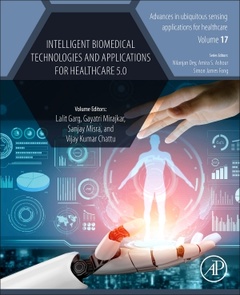Intelligent Biomedical Technologies and Applications for Healthcare 5.0 Advances in ubiquitous sensing applications for healthcare Series
Coordonnateurs : Garg Lalit, Mirajkar Gayatri, Misra Sanjay, Chattu Vijay Kumar

Intelligent Biomedical Technologies and Applications for Healthcare 5.0, Volume Seventeen covers artificial health intelligence, biomedical image analysis, 5G, the Internet of Medical Things, intelligent healthcare systems, and extended health intelligence (EHI). This volume contains four sections. The focus of the first section is health data analytics and applications. The second section covers research on information exchange and knowledge sharing. The third section is on the Internet of Things (IoT) and the Internet of Everything (IoE)-based solutions. The final section focuses on the implementation, assessment, adoption, and management of healthcare informatics solutions. This new volume in the Advances in Ubiquitous Sensing Applications for Healthcare series focuses on innovative methods in the healthcare industry and will be useful for biomedical engineers, researchers, and students working in interdisciplinary fields of research. This volume bridges these newly developing technologies and the medical community in the rapidly developing healthcare world, introducing them to modern healthcare advances such as EHI and Smart Healthcare Systems.
Part I: Blockchain Applications in Healthcare 1. Blockchain Technology for Efficient (Patient) Data Management in Healthcare: A Review of Recent Techniques 2. BlockMom: Maternal and child health data co-custodianship in health 2.0 Part II: IoT in Healthcare 3. Secure Trusted Intelligent Things: Practical design considerations 4. IoT as a piggy-back technology for transporting healthcare from health centres to the home 5. Intelligent Healthcare: Technologies Towards 5G Network for Intelligent Health-Care Using IoT notification with Machine Learning Programming 6. Satellite Imaging Applications in Healthcare: A literature review Part III: AI/ML-Based Techniques in Healthcare 7. An introductory review chapter on the applications of AI-based techniques in the analysis of MRI, CT, or PET scans can also include the fusion of MRI data with other modalities and their analysis to obtain a conclusion regarding the detection and classification of abnormalities (malignant/non-malignant). 8. Hepatic cancerous detection using a cutting-edge deep learning technique 9. A cost-effective way of implementing Big data in Health Research in developing countries – case of Malawi 10. An intelligent system to solve the problem of ever-increasing public hospital waiting lists 11. Hybrid Fuzzy-Based Improved Particle Swarm Optimization Technique for Cancer Cell Detection 12. Review paper on Performance Evaluation of automated techniques for detecting and diagnosing tumours/lesions in CT, MRI, or PET images. 13. Dual Customized U-Net Based Automated Diagnosis of Glaucoma 14. Diagnosis of Skin Cancer Using Artificial Intelligence Techniques: An Overview 15. Machine Learning Approach for Early Detection of Diabetes Using social media 16. AI bises, adversarial attacks and explainable AI in Healthcare 17. AI-applications in patient diagnosis: state of the art 18. The use of Big data in the healthcare industry during the covid-19 pandemic Part IV: M-Health Systems 19. A review chapter on mobile applications for healthcare management 20. A review chapter on mobile applications for detecting and measuring health conditions (data analytics approach). 21. Assessing the Validity, Reliability and Usability of a Newly Developed Smartphone-based Health 5.0 Application for Measuring Chronic Low Back Pain 22. Impact of 5G on Health 5.0 and its subsequent advantages and disadvantages 23. Impact of Industry 4.0 on Health 5.0 and beyond. Part V: Health 5.0 Opportunities and challenges 24. Learn from every patient - The Medical Translational Research model for Health 5.0 25. Digital Twin Frameworks in HealthCare: A Systematic Review 26. Security, privacy, and ethics issues in Health 5.0 27. Investigating the effect of a custom-developed Soft Ergonomics application on ergonomic compliance during computer usage to enhance or improve the health and wellbeing of its users 28. The influence of IoT on health organization’s behaviour and the associated risks and benefits 29. The Covid-19 outbreak impact on patient data collection, security, patient privacy, and Information exchange 30. Smart home applications in healthcare applications 31. Improving interoperability between Health Information Technology (HIT) systems in Mental Health and Acute Hospitals
Gayatri Mirajkar (Senior Member, IEEE) received the Bachelor of Engineering degree in Electronics Engineering from Karmaveer Bhaurao Patil College of Engineering, Satara, India, the Master of Technology in Electronics and Telecommunication Engineering from Dr Babasaheb Ambedkar Technological University, Lonere, India, in 2005, and the PhD degree in Electronics Engineering from Shivaji University, Kolhapur, India in 2014. She has published several papers in journals and conferences. She has presented her research contributions at IEEE International Conferences in G
- Provides a comprehensive technological review of cutting-edge information in the wide domain of Healthcare 5.0
- Introduces concepts that combine computational methods, network standards, and healthcare systems to provide a much improved, more affordable experience delivered by healthcare services to its customers
- Presents innovative solutions utilizing informatics to deal with various healthcare technology issues
Date de parution : 11-2024
Ouvrage de 350 p.
19x23.3 cm
Thèmes d’Intelligent Biomedical Technologies and Applications for... :
Mots-clés :
Healthcare 5.0; Healthcare; Blockchain Applications; IoT; Deep Learning; Particle Swarm Optimization; Automated Diagnosis; Artificial Intelligence; Mobile Applications; 5G; health data security; healthcare data exchange; patient privacy; smart homes; wearable computing; satellite sensors; remote sensing



